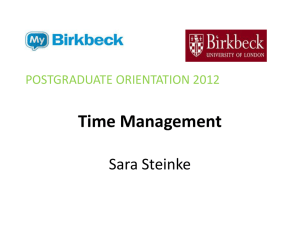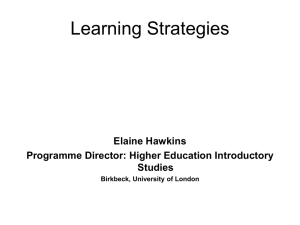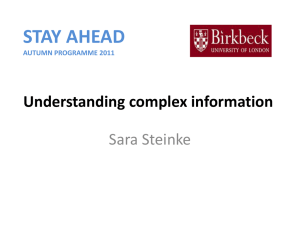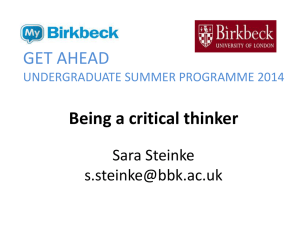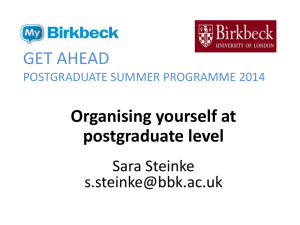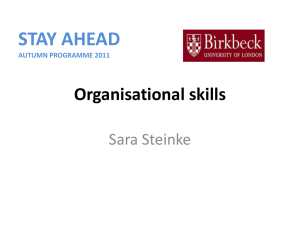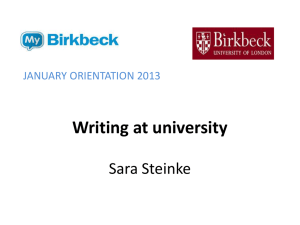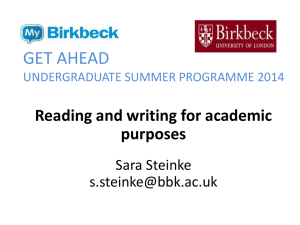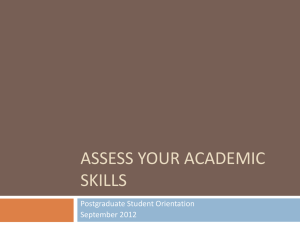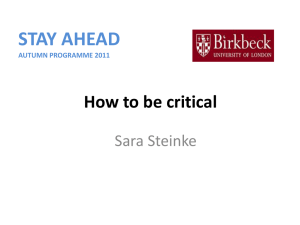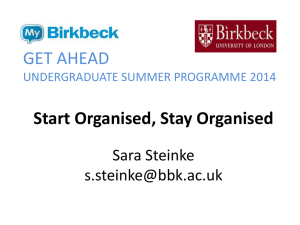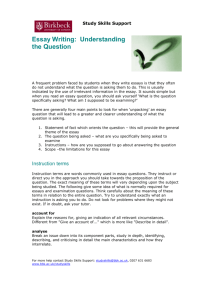Independent learning and thinking
advertisement
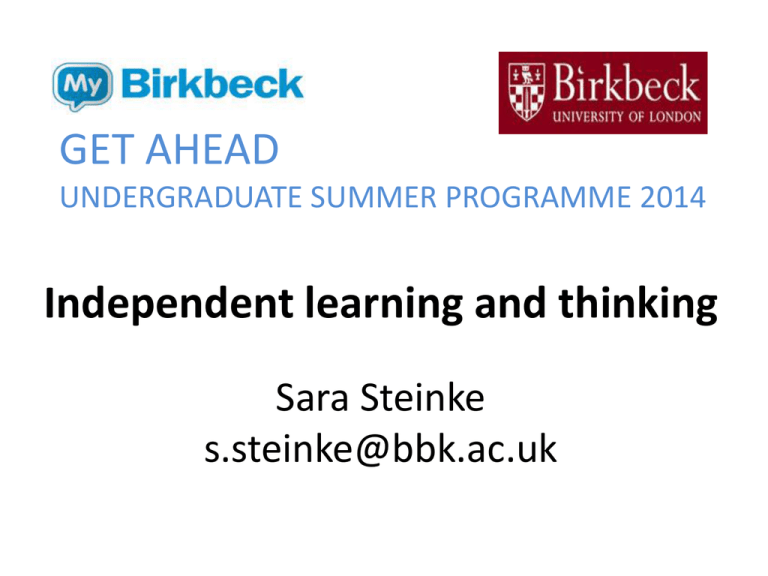
GET AHEAD UNDERGRADUATE SUMMER PROGRAMME 2014 Independent learning and thinking Sara Steinke s.steinke@bbk.ac.uk Aims of the session • Importance of being an active and reflective learner - C.R.E.A.M. strategy • Value of being organised in your studies time management 3 Ps - procrastination, perfectionism and prioritisation • Becoming a independent critical thinker Cottrell, S. The Study Skills Handbook C - Creative have the confidence to use your individual strategies and styles, apply imagination to your learning R - Reflective sit with your experience, analyse and evaluate your own performance and draw lessons from it E - Effective organise your space, time, priorities, state of mind and resources to the maximum benefit A - Active be personally involved, do things, physically and mentally in order to make sense of what you learn M - Motivated be aware of your desired outcomes using short and long-term 'goals' 5 reasons to be organised 1. Adult learners have many, often competing, demands on their time; work, family, friends and studying 2. Poor organisational skills prevents students from achieving their best, NOT ability 3. Related to other study skills - study space/resources, essay writing, presentation, exams, revision, reading for academic purposes, note-making 4. Helps you to achieve your goals - S.M.A.R.T. 5. Link to employability - transferable skill "Time management is the skill which above all others can make the difference between graduating and drop out.” Ruth Pickford and Sally Brown, Assessing Skills and Practice • What is meant by time management • Where your time goes • How well you use your time What is time management • Time management is about organising your competing priorities in the limited time available • Time management often has very little to do with time • It is about organising your life around what is important to you, dealing with and confronting more emotional issues like fear, inadequacy and other people’s demands on you What current pressures are there on your time? Studying socialising Have you thought about how you are going to fit travel studying into your wider schedule? work Can you foresee any problems which may arise? lectures, reading, writing sleeping/ eating exercise/ relaxation home/ personnel 1. Small pockets of time - around 45 minutes - are more productive; short portions of time soon add up; take frequent breaks 2. Recognise and deal with procrastination; set goals; identify your time wasters (self-inflicted and given) 3. Pareto Principle - roughly 80% of results/effects come from 20% of effort/causes; 20% effort delivers an acceptable result, not perfect, but good enough 4. L’Oreal principal - ‘because you’re worth it’; educate your family, friends and colleagues to respect your study space/time 5. Use one diary to create a ‘to-do list’; prioritise tasks; note deadlines; write down dates you must begin working towards the deadlines, establish study timetable Mon Tues Wed Thurs Fri Sat Sun am 8-12 Gym/ Work Work Gym/ Work Work Work House work and errands House work and errands pm 12-6 Work Work Work Work Work Study Family/ Friends/ Fun Eve 6-9 BBK BBK BBK Gym Family/ Study Friends/ Fun Night 9-12 TV Library Key reading Key reading Family/ Family/ TV Friends/ Friends/ Fun Fun TV • Use one diary, carry with you at all times • Enter deadlines, lectures, appointments, including extra time needed to complete these tasks • Check diary everyday • Do not schedule 100% of your time, allow for emergencies/the unexpected • Plan time for family, friends, eating, shopping • Create to-do list, using prioritisation • Record follow up tasks 1. Have you created a dedicated study space? 2. Are you comfortable? 3. Have you enough space to work in? 4. Do you have all the equipment that you need? 5. How are you going to organise your notes/ books? • The 3 Ps • What is prioritisation • How to prioritise The 3 Ps • Avoid PROCRASTINATION • No such thing as PERFECTIONISM • Learn how to PRIORITISE Procrastination • Avoid lots of displacement activities • Check that your study goals are realistic are you trying to do too much? - S.M.A.R.T. • Know yourself • Reward yourself • Just do it - something is better than nothing • Talk to your family members/friends, ask them to respect your study time • Identify your time wasters • • • • • • • • • • • • • • Procrastination Perfectionism Lack of self discipline Worrying Personal disorganisation Lack of priorities Inability to say ‘no’ Indecisiveness Socialising (too much) Intrusions (visitors, calls) Not finding resources Excessive family demands Not able to contact people Facebook/Twitter/internet 1. Which of these time wasters apply to you? 2. How are you going to deal with these time wasters? What is prioritisation • Quadrant A - Urgent and Important The Quadrant of Necessities - reactive tasks that need to be done, often at the last minute. Crises, 'fire-fighting' and looming deadlines are typical examples. • Quadrant B - Important but not Urgent The Quadrant of Quality - proactive tasks, often habitual, that maintain or improve the quality of your work and life. The more you expand this quadrant, the more you reduce the other three, particularly 'pseudo-emergencies' that should never have been allowed to become so. • Quadrant C - Urgent but not Important The Quadrant of Deception - plenty of people have gone home in the evening wondering where all the time went. Well, it was here! It's so easy to get sucked into doing things that are the wrong side of the 80-20 rule. • Quadrant D - Neither Urgent or Important The Quadrant of Waste - you know what it is and you know when you've been in it. The trick is to know when you're in it. Often, it starts out as restful time (which is Quadrant B). List of things to do 1. Print/submit essay for today’s deadline 2. Start to prepare presentation for next week’s seminar 3. Sick child requiring urgent doctor’s appt. 4. Plan for work meeting taking place tomorrow 5. Book holiday for next summer A Importance Need to do scale 6 (unimportant) to 10 (essential) B Urgency Do now scale 1 (must be done at once) to 5 (it can wait) C Subtract the score in column B from column A. The higher scores in column C are priorities. D Order of priority/ When to do Number the order of priorities List of things to do 1. Print/submit essay for today’s deadline 2. Start to prepare presentation for next week’s seminar 3. Sick child requiring urgent doctor’s appt. 4. Plan for work meeting taking place tomorrow 5. Book holiday for next summer A Importance Need to do scale 6 (unimportant) to 10 (essential) B Urgency Do now scale 1 (must be done at once) to 5 (it can wait) C Subtract the score in column B from column A. The higher scores in column C are priorities. 10 1 9 8 3 5 10 1 9 9 2 7 6 5 1 D Order of priority/ When to do Number the order of priorities Time management and organisation Do you: have strategies to help you plan and organise your time? know how much time you have available for your studies? know what makes studying more effective for you (i.e. when and where you study best)? keep a diary or calendar so you know when to attend lectures and when assignments are due? Useful resources for organisation skills Cottrell, S. (2008) The Study Skills Handbook, 3rd Edition (London, Palgrave) chapter 4 ‘The C.R.E.A.M. Strategy for learning’ pp.70-79 http://www.palgrave.com/skills4study/studyskills/learning/time.asp helpful information on organisational skills on the Skills4Study website http://www.bbk.ac.uk/mybirkbeck/studyskills/course timetable academic skills workshops which deal with organisational skills - and other study skills - in greater detail http://www.bbk.ac.uk/mybirkbeck/get-ahead-stay-ahead/academicsupport/organisational-skills 20 minute interactive tutorial supporting this Student Orientation programme • Everyday critical reasoning skills • Importance of critical thinking skills at university • The process of critical thinking • Critical thinking questions Everyday critical reasoning skills (1) You think critically all the time for example when: - deciding whether or not to buy a particular product - telling your friends why you like/dislike a film/book/piece of music - reacting to a news story - deciding which school to send your child to Everyday critical reasoning skills (2) You can react in many different ways to a (new) idea or proposition: - reject it - accept it - half believe it - believe aspects of it - investigate further, find evidence for or against, ask probing questions and come to your own conclusions Think about the following a) Job opportunities /promotion What factors were involved in your decision to study a particular course at Birkbeck? b) Desire to return to learning c) Financial concerns d) Time constraints e) Course subject f) Other reasons Importance of critical thinking at university (1) • Occurs across all teaching/learning/research activities - cornerstone of academic study • Involves thinking analytically about yours and other peoples work/ideas - adopting a critical distance • Pushes the boundaries of knowledge forward examines the grey area, rather than providing black or white, yes or no answers • Transferable skill to the workplace Importance of critical thinking at university (2) • Not simply related to academic content; also involves the journey of discovery - a process • Involves a variety of academic skills - reading, note-taking, essay/report writing, revision strategy, exam technique, presentations, organisational skills, time management • Requires an active, independent and reflective approach to learning - C.R.E.A.M. approach to learning (Stella Cottrell) 12 things a critical thinkers can do 1. Summarise complex ideas 7. Solve complex problems 2. Evaluate arguments and evidence 8. See connections between subjects 3. Understand opposing positions 9. Distinguish between emotive and neutral vocabulary 4. Draw reasonable conclusions 5. Predict logical consequences 6. Devise sensible alternatives 10. Distinguish between theory, fact and opinion 11. Recognise and resist manipulation 12. Read ‘between the lines’ In the process of critical thinking you: • Analyse (take apart) - Look at the key points, arguments and underlying assumptions - Comprehend the key points and arguments - Compare and contrast arguments - Look at the different components of the argument and how they relate to each other • Synthesise (put together) - Pull together different arguments to express a proposition/idea - Make logical connections to serve one argument • Evaluate (create your own) - Criticise views you do not agree with/arguments that do not hold up - Weigh up and come to your own judgement - Justify your view with the evidence you have found and develop your own arguments Think about the following You have been asked to read an article in preparation for a lecture. What questions might you ask in order to think critically about the article? 1. What is the main argument of the article? 2. What are the reasons given to justify the argument? 3. What evidence has been used? 4. What do you know about the author? 5. What audience is the author addressing? 6. What sources has the author used? Critical thinking Can you: distinguish between fact and opinion? draw conclusions based on evidence? account for different points of view and detect bias? see the wider picture? do you know the difference between description, analysis and evaluation? Useful sources for critical thinking Cottrell, S. (2005) Critical Thinking Skills (London, Palgrave) http://www.palgrave.com/skills4study/mp3s.asp#Critical 12 minute audio file based on Cottrell’s Critical Thinking Skills http://www.palgrave.com/skills4study/studyskills/thinking/index.asp helpful information on critical thinking skills on the Skills4Study Website http://www.bbk.ac.uk/mybirkbeck/get-ahead-stay ahead/skills/critical-thinking 5 minute interactive tutorials supporting this Student Orientation programme http://www.bbk.ac.uk/mybirkbeck/studyskills/course_timetable academic skills workshops dealing with critical thinking skills – and other academic skills - in greater detail Recap of the session • Importance of being an active and reflective learner - C.R.E.A.M. strategy • Value of being organised in your studies time management 3 Ps - procrastination, perfectionism and prioritisation • Becoming a independent critical thinker Presentations can be found at http://www.bbk.ac.uk/mybirkbeck/services/ orientation/get-ready-to-study-at-birkbeck
